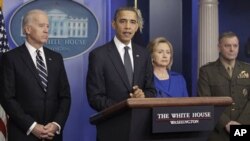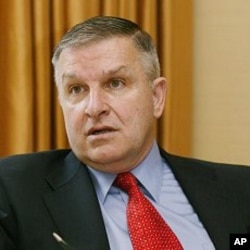One of the central foreign policy questions facing the Obama administration is the conflict in Afghanistan.
The Obama administration's latest strategy review on Afghanistan indicates U.S. forces can begin a scheduled drawdown next July. The aim is to hand over combat operations to the Afghan security forces by the end of 2014 - if the situation permits it.
In presenting the strategy review, President Barack Obama recently said to ensure Afghans take responsibility, the United States is continuing to focus on training.
"Targets for the growth of Afghan security forces are being met. And because of the contributions of additional trainers from our coalition partners, I am confident we will continue to meet our goals," said Obama.
But retired U.S. Marine Corps General Anthony Zinni says the training situation in Afghanistan is mixed.
"The military training is probably going well from what I can see and understand, well enough - it is still a long way to go. The police training is concerning," said Zinni. "I think there has to be a lot more investment in that. There needs to be a lot more follow-up. There are problems, I think, in the ranks in terms of not only quality and performance to ensure the lack of corruption, but their ability to relate to the people - and that has probably not gone as well."
Zinni and others say a key problem in Afghanistan is rampant corruption, and it will not be easy to root out.
"It takes a long time because it is so endemic to almost every level of the leadership and governance," he said. "You have to start not only at the top, but also work it all the way down to the bottom. It is not going to happen overnight. If it is so well ensconced in the entire system, it is going to take a lot of time, a committed leadership and most importantly - we have to constantly ensure that we have eyes on what goes on and we call out the corruption when we see it and, most importantly, make it public."
Former Secretary of State Lawrence Eagleburger, who served in 1992 in the George H.W. Bush administration, agrees fighting corruption in Afghanistan is a very difficult proposition.
"There is no guarantee we can do it. We have dealt with situations like this to some degree in the past in other countries," said Eagleburger. "But this is a Herculean task and I can not assure you that it will not be easily overcome, there is no question about that. We have to hope that by staying until 2014 we will be able to have enough time to root it out - but I certainly can not guarantee it."
Eagleburger also questions whether Afghan President Hamid Karzai is able to fight corruption, whether he is capable of running the country, and whether he is a reliable partner for the United States.
"I have my doubts. But at the moment he is all that is available, I gather, so we have to go with what we have got," said Eagleburger. "I would have to hope that I am wrong and he is better than I think he is. But at the moment I have to answer your question honestly and I do not think he is up to it."
Eagleburger was asked if the United States is investing too much money and lives in Afghanistan.
"I wish I could answer that with a straight answer," he said. "If we were now for the first time making up our minds as to whether we should be involved in Afghanistan or not, I would be amongst those who would say we should not do it, that we should stay out. But now that we have made a decision and are in, I guess my answer to you would be we have very little choice now but to stay until we can achieve the success we hope for."
For retired General Anthony Zinni, success would include having a reasonable Afghan government with security forces capable of fighting extremists like the Taliban.
"[Also] the ability to keep out organizations like al-Qaida from getting a sanctuary in there and a government system that is reasonably responsive to the needs of their people," he said. "I think that is the best we should hope for. I do not think we should have any delusions about creating Jeffersonian democracy, free-market economies and that sort of thing."
While focusing on Afghanistan, Zinni said any resolution of the Afghan conflict must include Pakistan.
In his presentation of the new Afghan/Pakistan strategy, President Obama said the Pakistani government recognizes that terrorist networks in its border regions are a threat to all our countries, especially Pakistan. He said progress has not come fast enough, "So we will continue to insist to Pakistani leaders that terrorist safe havens within their borders must be dealt with"






